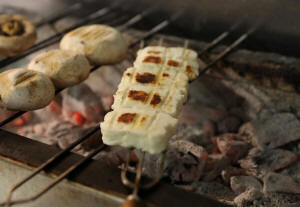Say cheese! Cyprus's halloumi gets EU protected status
 Send a link to a friend
Send a link to a friend
 [April 06, 2021]
ARADIPPOU, Cyprus (Reuters) - Cyprus
is getting protected status for its prized halloumi, giving its
producers the sole right to sell the rubbery cheese in the European
Union. [April 06, 2021]
ARADIPPOU, Cyprus (Reuters) - Cyprus
is getting protected status for its prized halloumi, giving its
producers the sole right to sell the rubbery cheese in the European
Union.
Later this month, the European Union is set to formally give halloumi,
or "hellim" in Turkish, the protected designation of origin (PDO)
status, which will come into effect from October, according to Cyprus'
agriculture ministry.
The move reaffirms what the industry and state have said for years, said
cheesemaker George Petrou, general manager of Petrou Bros. Dairy
Products which has about 25% of Cyprus' export market: that halloumi is
Cypriot, with historical accounts suggesting production as early as
around 1500.
"Unfortunately in recent years many countries tried to copy us so the
registration will help very much, in that other countries will not
produce halloumi or something similar which misleads consumers," he
said.

As a child, Petrou learnt the secrets of making halloumi from his late
mother, Kakkoulou, who sold it at farmers' markets. As she gently
stirred the milk to separate the curds in a vast "hartzin", or cauldron,
he would mill around the kitchen, observing her.
In 1982, Petrou started selling halloumi under the Alambra brand to
supplement his income as a first-division footballer, and he hasn't
looked back.
From using 250 litres of milk a day to make halloumi, Petrou's company,
initially set up with an elder brother, now processes 250 tonnes of milk
per day, employing 220 people and exporting to 40 countries.
[to top of second column]
|

Grilled halloumi is seen in a restaurant in Nicosia, Cyprus, April
2, 2021. Picture taken April 2, 2021. REUTERS/Yiannis Kourtoglou

Its expansion mirrors that of Cyprus' halloumi production.
Now the country's second-most valuable export after pharmaceuticals,
the industry has grown between 20% and 22% annually for the past
five years, according to official data. The agriculture ministry
says it has now set its sights on penetrating the China market.
There were hurdles to overcome in securing the prized PDO status,
including disagreements on the ratios of goat, sheep and cows' milk
in the recipe.
Until 2024, the ratios will be set by decree, and after that at
least 50% will be made up of sheep and goats' milk, with the rest
supplemented by cows' milk.
Though recipes for halloumi abound online, for locals, enjoyment is
in the versatile cheese's simplest form - tossed in the frying pan
or on a barbecue, eaten raw with melon in the summer, or cubed and
thrown in to boil with trahana, a cracked wheat and yoghurt soup
eaten in winter.
"A lot of tourists come here looking for it," said Evroulla Ioannou,
who serves up grilled halloumi at her popular restaurant in Nicosia,
Cyprus's capital.
"Some ... only know it by name so they come to try it, and from what
I see, they really like it," she said.
(Reporting by Michele Kambas; Editing by Karishma Singh)
[© 2021 Thomson Reuters. All rights
reserved.] Copyright 2021 Reuters. All rights reserved. This material may not be published,
broadcast, rewritten or redistributed.
Thompson Reuters is solely responsible for this content. |